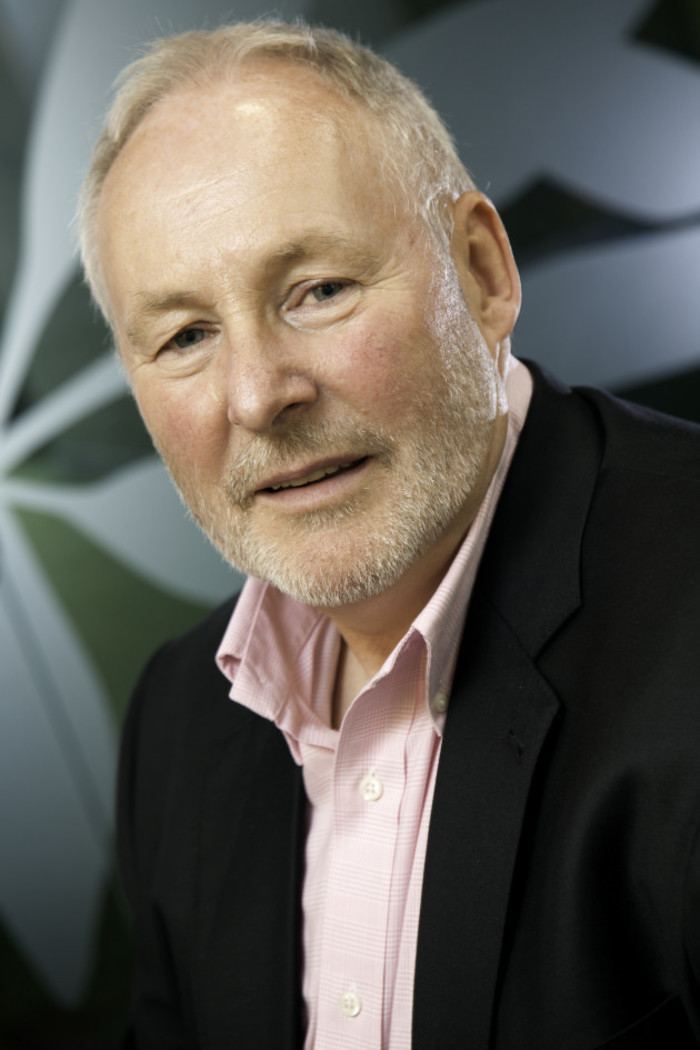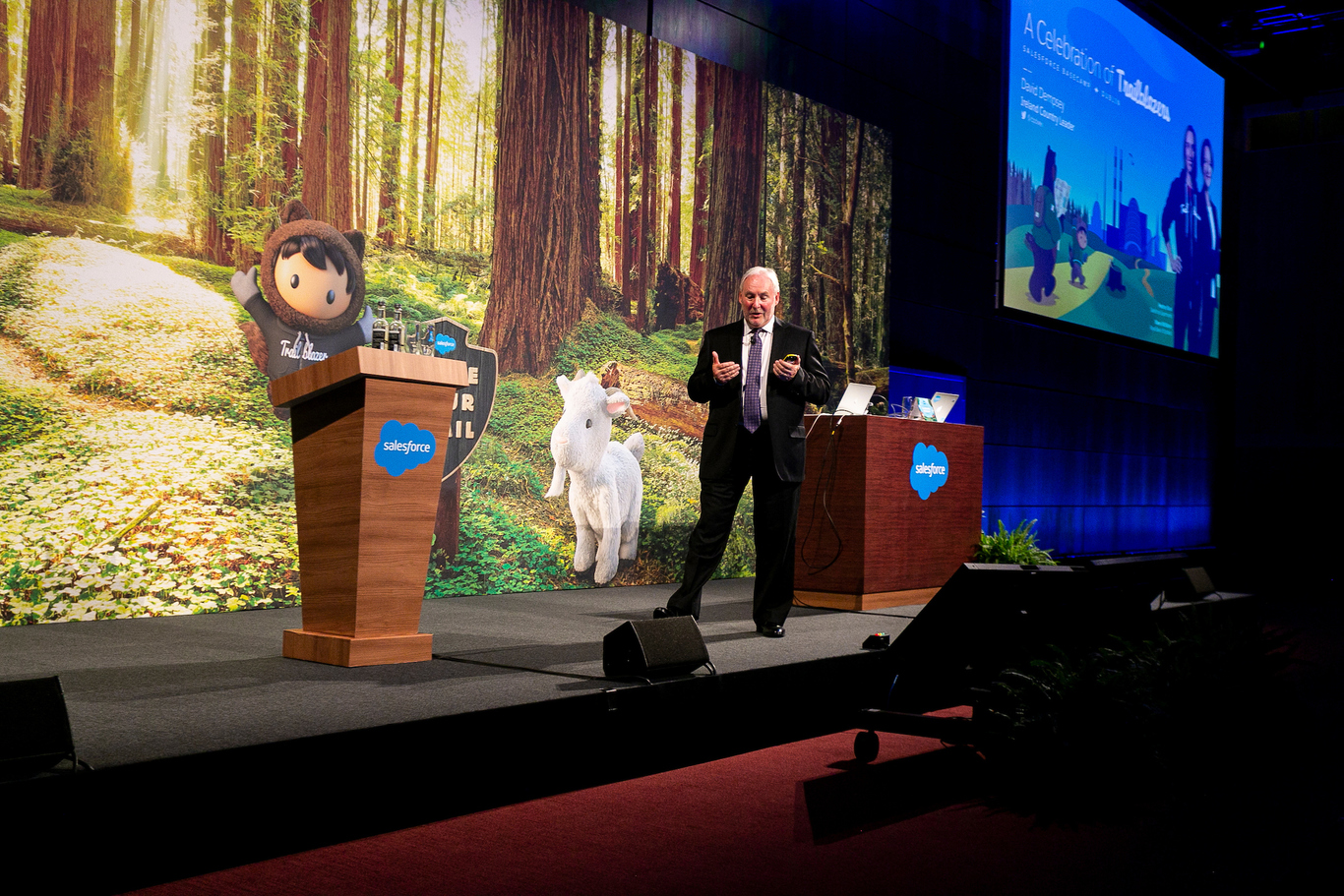'What I've learned about business from the RNLI is the value of teamwork'
Tools of the Trade: David Dempsey, country leader and general manager of Salesforce Ireland, on why he never takes meetings between 12 and 2 pm
EVERY WEEK, FORA gets inside the heads of some of Ireland’s top entrepreneurs to gain insights into what got them to the top of their trade. This week we spoke to David Dempsey, country leader and general manager of Salesforce Ireland.
Despite a busy schedule steering cloud-software giant Salesforce in Europe, David Dempsey manages to take two hours for wellness every afternoon – and also volunteers with the Royal National Lifeboat Institution (RNLI) in his spare time.
Salesforce makes Software as a Service (Saas) customer relationship management (CRM) management solutions using cloud technology. It was founded by Marc Benioff in 1999 and set up in Ireland for Europe by Dempsey in 2000.
As part of our weekly Tools of the Trade series, we spoke to Dempsey about planning, the environment and his close friendship with Olympian Jerry Kiernan.
What are the main principles that inform what you do?
Customer success, trust, innovation and equality. They are the same values we had 20 years ago and they’ve never changed. At this stage, they’re completely ingrained in our culture. They’re the values that drive and inform me every day as well.
What differentiates your company from the competition?
We’re a software as a service company. We don’t sell software in the traditional way, we rent it, so it’s a subscription business. We have a massive focus on customer success because if our customers aren’t successful we aren’t successful. That’s a big differentiator for us, that customer-success-focus.
The other thing is our focus on giving back, as a company, since we started.
We’re in a very privileged position and we feel we can use that privilege to give back to the communities we operate in.
We have a philanthropic model that we established at the same time as Salesforce. We set aside 1% of our employee time, 1% of our complete product and 1% of our company equity to improve the communities around the world that we will be operating in.
Where would you like to improve?
The area around skills. I think we have a responsibility as business leaders to prepare the workforce for the fourth industrial revolution – the digitisation of the economy.
There is a whole section of the workforce that probably live outside that space now and I think there’s a real need for education. There’s no other societal force that has such an ability to level the playing field as education.
Where we specifically want to focus our improvement is around sustainability. When you look at companies like Salesforce, traditionally we would have answered to our shareholders but I think more and more businesses are now focused on their stakeholders.
The environment is a massive stakeholder for us. One of the things that we want to continue to improve our focus on is protecting our planet.
More and more businesses are such big influencers and such big consumers of the planet’s renewable resources. We have a massive part to play. Our improvement is to continue to work towards being a carbon-neutral business.
How do you deal with stress?
For stress in work, the best way to deal with that is careful planning.
Our business plan is slightly different. It’s something we call a v2mom. The two v’s are vision and values…and the mom part is the measures we’re going to take, the obstacles that might get in the way, and the measures – so we know what we’re doing and how well we’re doing it. That sort of planning takes a lot of stress out of running a business as complex as Salesforce.
On a personal level, exercise. In the 20 years I’ve been here, I never take a meeting between 12 and 2. I just take time out to go for a run or take some exercise, but really just get out and switch off and come back refreshed.
I think it’s really important to set aside time for exercise or just wellness and looking after yourself.
What was a big turning point in your life?
Establishing Salesforce in Ireland 20 years ago. Back in the late 1990s, two colleagues and I read an article about a company called Salesforce and this company was developing new enterprise-level software and was going to make that as easy to consume as buying a book on Amazon.
That changed the industry from our point of view, it was the democratisation of the industry. It meant that a very complex product (CRM) was now going to be available in a different business model by renting it as a subscription. Companies who would traditionally not have access to that level of software now would have on a rental basis.
A big turning point was when we reached out to the founder of Salesforce, Marc Benioff, and got him to agree that he would trust us to bring Salesforce into Europe. We established Salesforce Europe here in Dublin back in early 2000.
That was a massive change for me. I was in a traditional software company before that.
What’s something you’ve learned outside of business that you brought to your career?
I returned late-ish in life to continuous education. I think that access to education, many years after I left school the first time, made a massive difference to me. It opened up a whole new world for me and provided much more perspective in the world of business.
I went on to complete my doctorate at the Waterford Institute of Technology. That broadened my business mind. There’s no substitute for the continuous value of continued access to education.
The other thing is, I volunteer with the RNLI. I’m part of the lifeboat crew in Wexford. I think the one thing that I’ve learned about business from the RNLI is the value of teamwork.
If our pagers go off at night, 28 people turn up to the lifeboat station, all of us from different backgrounds, but each of us has a job to do in the team. Each one in that team needs to pull together in those moments when something goes wrong.
What was your biggest business wake-up call?
I think the software industry, traditionally, didn’t really think about whether people used its software or not. The business recognised its revenue once they shipped the software out the door, and that was recognised as a sale.
In our case with (SaaS), our revenue comes as a monthly subscription and, because of that, it took a while for our industry to recognise the importance of subscription renewal. We were probably running about 5 years, and we really started to look at the impact on our business of customer subscription renewal. That was a massive wake-up call; the realisation of just how important that was to us as a business.
What’s a common misconception about your industry?
There’s a misconception that CRM solutions, because they’re complex, are only for big companies who can afford them. One of the things Salesforce did was make CRM available to small and medium enterprises.

What’s one thing you wish your employees knew about you?
Sometimes when you’re an executive in business your interactions tend to be more formal. We have no asset as important to us as the people we have here. That’s the one thing I (want) people to really understand about me – just how much respect I have for all our people here and everything they do.
Who have you learned the most from in your career/life?
Marc Benioff, the founder of Salesforce back in 1999. He’s a massive visionary for the industry. And he changed the whole industry with our SaaS business model, and changed the way that business interacts with the rest of the world with our philanthropic model.
His whole focus is on business being a platform for good and for change, rather than just being a commercial enterprise that operates to maximise value for shareholders.
The other big influence on my life is Jerry Kiernan the Olympic marathon runner. I’m very close to Jerry, and back then when he was getting ready to run the Olympic marathon in Los Angeles in 1984, I spent every morning running with him in the year leading up to it.
His personal belief in his own ability and that a schoolteacher from Foxrock could go and compete there with the best in the world was never shaken. That’s something he has instilled in me, that if you put in the work you will get the results.
What book would you recommend the most?
Drawdown, by Paul Hawkins (editor). It’s a technical book, but it sets out a hundred solutions to the global climate crisis. It’s science-based, so it’s the hundred most substantial solutions. Most people think I have to recycle locally etc., but these are big solutions.
It’s a tough read but it’s science-based and it takes the social media answers out of it. I keep it on my desk in office.
Note: David Dempsey’s title in this article has been updated.
Get our Daily Briefing with the morning’s most important headlines for innovative Irish businesses.







